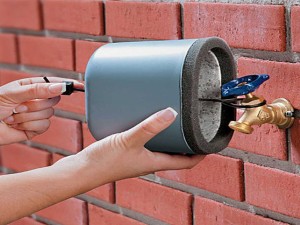5 Plumbing Tips to Prepare for the Nevada County Winter
If you’ve lived in the Grass Valley / Nevada County area for a few years or more–and especially if you live above 2500′ or so–chances are you’ve been pinched by the winter weather at least a couple times. And if that pinch involved your water pipes or plumbing, you probably don’t ever want to feel it again.
We don’t want you to feel it either–so we’ve put together 5 easy ways to make it through the winter without any plumbing-related pain.
 1) Insulate your pipes
1) Insulate your pipes
The first and most obvious step to take to protect against is to insulate hot and cold water pipes in the crawlspace under your house as well as in the basement, attic, and exterior walls (if accessible) with snap-on foam insulation. Make sure foam insulation fits tightly without gaps. Apply duct tape to joints in insulation, and miter foam around elbows, so joints in pipes are completely covered.
2) Stow the Hose and Cover the Bibs
Hose bibs–the outside faucets where you attach your hose–are one of the most common places for frozen pipes to burst. If you leave a hose connected to the bib, the water in the hose can damage the bib from the outside upon freezing. Disconnect and drain garden hoses from hose bibs.
Even with the hose removed, exposed bibs and the outside pipe are extremely vulnerable to the cold. Protect exterior hose bibs around your foundation, with insulated foam covers found at any local hardware store.
3) Turn Off and Drain your Irrigation System
Water left sitting in the pipes of your sprinkler/irrigation system will expand when it freeze and that can cause a lot of damage–to your sprinkler heads and other components, as well as the pipes themselves. Some systems will have a manual drain, located at the lowest point of your irrigation. Other systems might not be so simple; if you’re unsure, call your landscape install professional or a qualified plumber.
 4) Do a Leak Check
4) Do a Leak Check
Do you have any known leaks that you’ve been putting off? Fix them before they become a bigger problem. And take a few minutes (and a flashlight) to check the visible pipes and joints inside and outside. Better to find them now than in January (or worse, on Christmas Eve.)
5) Keep the Furnace On
If you are going out of town, don’t turn your furnace off. Instead schedule your thermostat to keep your home warm to avoid frozen pipes. The few bucks you’ll spend on that heat is a small price to pay to avoid coming home to a water-damage nightmare.
Bonus Tip: Bring in the Pros
We’d be remiss if we didn’t mention that the safest and easiest way to take care of all this stuff is to call your local full-service plumber and let them deal with it all. They know what to look for*, they have the parts and supplies needed to get the job done*, and they have the experience to do it right* so you can sleep easy (and dry) throughout the winter season, no matter what elevation in the Sierra Foothills you call home.
*They do for sure, if “they” are Craig Johnson Plumbing. We can’t speak for everyone! 😉
